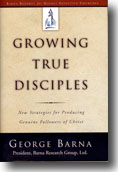Did Jesus command every Christian to help make disciples? For most of my life, I didn’t think so.
Every Christian is (or should be) in the business of helping to make disciples.

Whose job is it to “make disciples”?
Having been raised in the liturgical church that emphasized external religious practices instead of the Bible, I grew up believing that the task of making disciples was assigned to missionaries. Once a year, we would have “Mission Sunday”.
A missionary, having traveled from the other side of the world, would preach a ten-minute sermon wherein he would describe the adverse conditions experienced by the people he served. There would be a second collection taken, with the money going to the missionary.
Then we would all promptly forget about it until the next year.
I can’t believe I really thought like that back then, but I did.
In more recent decades, having begun to become enlightened by years of listening to Bible teaching, I came to see that I had it all wrong. The task of making disciples is something we all should be doing.
Churches are supposed to equip all of us to teach and encourage (ie., disciple) others. And this doesn’t necessarily mean going to distant places, either. The need is great right here.
Over a couple of decades or more, as I listened to sermons from pastors in Evangelical Bible churches, I imagined the congregations as being filled with eager, fully-committed Christians, every person hanging on every word the pastor spoke. I pictured each and every person striving with all their might to become a disciple of Jesus. I thought, “How could anyone sit under teaching like that and not be moved to dig deeper and learn all that they could?”
But What Are Christians Really Like?
Now that I have joined an Evangelical Bible church1, I’ve met many Christians who are just as I imagined they would be. But to my astonishment, I also found that not all are like that. Some appear to be just going through the motions.
I began to notice, as I listened more carefully to the Bible preachers I’ve been learning from, that the latter condition describes the majority in our society today.
Columnist Barry Goldman began an editorial (originally for the Los Angeles Times; reprinted in the Minneapolis Star Tribune where I read it) with this anecdote. As I read the following quote one Sunday, it grabbed my attention. With just a few slight differences, he was describing the person I used to be:
And thus, Aunt Mary gave herself permission to do nothing; to know nothing; to wrap herself in a false security that merely identifying with (in her case) the Jews would result in salvation.
I’ve observed this phenomenon even closer at hand.
When I was still in the Liturgical church, I recall a Sunday when the Old Testament reading was about Noah and the Flood. When the priest preached his sermon, he noted that those in the ark were saved, and the others were not. So far, so good. Noah and his family believed what God said, and did what He told them to do.
But then, the priest went on to say that “today, the ark represents “The Church”. He strongly implied that if we all just remained in “The Church”, we would, so to speak, be delivered safely through the tempest-tossed sea of life to the shores of heaven!
But nowhere in the Bible has God said anything to suggest that membership in any religion will gain us salvation. With God, it’s all about relationship, not religion.
I can’t recall where I read this next item, but I think it’s a great analogy:
Just as sitting in the stands at a baseball game does not make you a baseball player, neither does merely sitting in church for an hour on Sunday make you a Christian! We can’t be “spectator Christians”. We’ve got to get into the game!
Recalling that aphorism also reminded me of this statement by author and poll-taker George Barna2:
Jesus did not minister, die, and rise from the dead merely to enlist fans.
George Barna — Growing True Disciples; p.98
But apparently, spiritual apathy is not a new phenomenon.
Near the end of chapter 5 of the book of Hebrews, the writer describes how Christ did not exalt himself, but was appointed by the Father. He goes on to state how Jesus became the source of eternal salvation “after the order of Melchizedek.”
In the final paragraph, you can feel the exasperation the writer of Hebrews felt as he pauses to lament:
11 About this we have much to say, and it is hard to explain, since you have become dull of hearing. 12 For though by this time you ought to be teachers, you need someone to teach you again the basic principles of the oracles of God. You need milk, not solid food, 13 for everyone who lives on milk is unskilled in the word of righteousness, since he is a child. 14 But solid food is for the mature, for those who have their powers of discernment trained by constant practice to distinguish good from evil. (Hebrews 5:11-16)
Evidently their Christian walk had lapsed. Like so many today, they were not taking their faith seriously either.
I’m quoting now from a study guide accompanying a series of sermons by Dr. David Jeremiah3 based upon the book of Hebrews:
In recent years, social scientists and psychologists have noted the increasing difficulty twenty-somethings are having in making the transition from adolescence to adulthood. This has become known as the “Peter Pan Syndrome”, named after the mischievous young boy in the fantasy novel by J. M. Barrie.”
…
“The writer of the Book of Hebrews addresses a spiritual version of the Peter Pan Syndrome — a refusal to push forward and grow up spiritually.”
Symptoms:
- They were dull of hearing.
- They ought to have been teachers, so they could make disciples.
- Instead, they needed someone to teach them again.
- Being “baby Christians”, they needed milk, not solid food.
- Indeed, everyone who lives on milk is unskilled in handling the Word of God.
- Why? Because their Christian life is that of a child, and a child cannot make disciples.
Those symptoms describe the person I used to be. Sadly, I see many people today in that same condition.
Quoting again from Dr. Jeremiah’s study guide:
There are three stages in the Christian experience. First, you need to be fed by others. Then you can feed yourself. Finally, you graduate to feeding others. That’s the way the Church continues to grow and multiply itself — if everyone is moving through the stages as they should.” —Page 115
Pastor James MacDonald refers to them as “Dead Sea” Christians.
In one of his powerful Walk In The Word 4 sermons, Pastor James describes those who never progress beyond the “feed-me” stage as being like the Dead Sea: streams flow into the Dead Sea, but nothing flows out of it! Thus, it’s dead; there is no life in it.
Pastor Chip Ingram5 has created what he calls “R12 — True Spirituality”. It’s based on chapter 12 of the Book of Romans, which is a veritable outline of what a true disciple ought to be like. In the opening message, Pastor Chip laments the fact that, though there are many “decisions” for Christ, why there are so few disciples?
I heard a wonderful sermon by Pastor Alistair Begg6, entitled: “Holding Firmly To The End”. It really helped me to articulate how to know whether or not someone who professes to be a Christian really is. I can think of times when I wish I’d had this wisdom.
This audio sermon is actually the second part of a longer message. This part was broadcast on August 29, 2013; (used here with permission.)
If you can, open your Bible to Hebrews 3:6, as Alistair Begg6 begins by describing THE distinguishing characteristic of a genuine follower of Jesus.
As you listen to this message, notice how God will either confirm your identity as a true Christian, or reveal to you how He wants you to grow!
The pastors mentioned above and many other pastors appear to be preaching these messages because they are seeing far too many who are still stuck in the lowest level of Christianity. And they are not alone in their concern for the well-being of the Body of Christ.
Author and Christian researcher George Barna reports rather bluntly how we as a nation really are.
George Barna2, well known for the polls his company conducts, has written a book entitled, “Seven Faith Tribes”. In a chapter entitled, “America Is On The Path To Self-destruction”, he describes two groups of adult Americans who identify themselves as Christians: “Casual Christians” and “Captive Christians”. Here are excerpts from that chapter.
In the first excerpt, Barna describes those whom he calls “Casual Christians:”
A large majority of Americans are Casual Christians. These are people who profess to be Christian but are notably lax in their beliefs and practices. Casuals represent two-thirds of all American adults. There are variations within this sizable spiritual class, but overall the segment is surprisingly consistent in numerous dimensions of spirituality and in their attitudes and lifestyle choices.
Page 18
I am forced to admit: that’s exactly how I lived most of my life.
George Barna goes on to describe “Captive Christians”:
Their counterpart are the Captive Christians-those whose consistently biblical beliefs and Christlike behavior validate their commitment to being followers of Christ. Captives constitute one-sixth of the adult population. They are characterized by a deeper, more intentional devotion to the principles and practices they embrace from the Bible. They are the segment within Christianity that is most likely to be caricatured by the media and by politicians, two groups that greatly misunderstand the motivations and objectives of Captives.
Page 18
I can honestly say: that’s the person I am now!
In his book “Generation EX-Christian”,7 author Drew Dyck describes six categories of “leavers” from the Christian faith: the Postmodernist, the Recoiler, the Modernist, the Neo-pagan, the Rebel, and the Drifter. I just want to share with you a few of his words about postmodernism:
As a worldview, postmodernism does have identifiable characteristics. The most succinct definition probably comes from the French philosopher Jean Lyotard, who famously defined postmodernism as “incredulity toward metanarratives.” What does that mean? Basically that those big stories — the kind of overarching narratives by which we define reality — are regarded with suspicion. In a postmodern world, no one story is large enough to contain the whole of reality, much less define it for all people.
…
It results in a radical redefinition of truth, reason, and reality. With no standard narrative to serve as a guide, reality is determined by individual experience. And since there are an endless variety of stories, nothing can be absolutely true for everyone.Drew Dyck – “Generation EX-Christian” – page 27
To quote the prophet Isaiah, “Who has believed our message?” (Isaiah 53:1). Clearly, fewer and fewer young adults.
Well, if I haven’t made my point yet, I probably never will.
How Might This Trend Be Reversed?
I certainly don’t claim to have a complete solution for this problem, nor do I claim to be a shining example of a true Christian. That said, I can identify what factors brought about the transformation in my life.
God initially used two things to grab my attention. One was a person; the other was a situation.
The Person
Interestingly enough, the person was a priest. Unlike most parish priests, this man knew his Bible, and could really preach!
In the mid-80’s, Joanne and I attended a three-evening parish retreat. I don’t remember much about it, but I remember this priest preaching on John 3:16:
For God so loved the world that He gave His only begotten Son, that whoever believes in Him should not perish but have everlasting life. (John 3:16)
The priest spoke at length about what they did to Jesus, and what would have been happening to His body during the scourging and the Crucifixion. I remember him saying that, even if I had been the only person in the world, Jesus would have suffered and died … just for me! That thought astonished me!
He instructed us to draw a circle around the words “the world” in that verse, and write in the word “me”. That was the first thing I ever wrote in my Bible. (You should see it now!)
The real “take-away” for me was the idea that it was possible to draw helpful wisdom for life today, from reading the Bible.
That concept was totally new to me. After forty-plus years in the “The Church”, that revelation astonished me! It left me with a ravenous hunger for more. So God used a situation as a way to feed that hunger.
The Situation
The other thing that helped to transform my life was the fact that our house, which was built in the early 1950’s, did not (and still does not) have an appliance for washing dishes in the kitchen. (When I say that in front of an audience, it always seems to make people laugh.)
Every family works out it’s own “division of labor”. In our household, I took on the task of standing at the kitchen sink up to my elbows in soapy water, washing the dishes.
I doubt that anybody would dispute the assertion that standing and washing dishes is a boring task. However, it does have one redeeming characteristic: it requires very little mental concentration.
So, rather than dwell on the drudgery of the dishes, I turned on the radio to a station that broadcasts Bible teaching. I began listening. I bet I’ve easily had literally thousands of hours of Bible wisdom preached into my ears, while working with my hands in soapy dishwater!
As I listened, I would have writing material handy, and jot down things I wanted to remember. I’d underline passages in my Bible, and write out verses to memorize on recipe cards. Occasionally, I would buy a copy of the whole series of messages, and study them in more detail. I was HUNGRY!
Within recent years, I’ve become aware of a third factor that God used to, as it were, “grow me up” spiritually. I’ll illustrate this with two short anecdotes.
First Anecdote:
I recall a conversation with a friend, as he described a moment from a class he was in. The instructor called on a classmate, asking him to explain a particular point.
The flustered student blurted out, “I… ummm… I know it, but… ahhh… I can’t explain it.”
The instructor replied, “If you can’t explain it, you don’t know it!”
The goal is not to become preachers. But at the very least, serious Christians should study, meditate on, and write notes about the points of Christianity they are studying, with the goal in mind of acquiring the ability to explain it — even if only to themselves.
More than one of the Bible preachers I listen to regularly have said to their listeners: “preach the Gospel to yourself every day.”
We need to do that because we get the “gospel” of the world “preached” to us every day. Turn on the radio or TV, and there it is. Pick up a magazine or newspaper, and there it is. Walk into a store, and there it is.
The “gospel / wisdom” of the world says, “What you don’t know won’t hurt you.” Have you heard that sermon? It probably came from the devil, and it’s wrong.
The truth is: what you don’t know can never help you!
Second Anecdote:
You can usually see more clearly when you look back.
It was not until more recent years when I realized that a shift had taken place in my spiritual life. In the earlier years of my Christian life, I realize now that I was mainly occupied with accumulating spiritual principles for myself. I read books; I listened to Bible teaching on the radio, on tapes, and more recently on digital media.
Then, in 2001, I began writing down some of the things I had learned. I’d try to share them with others, just in casual conversation. And for over two years, beginning in 2005, I taught a weekly Bible lesson to the men’s group in the church I was in. And looking back on those experiences, I realize now that doing those things caused me to grow spiritually.
When I began focusing on how to help others to understand and apply Bible knowledge, rather than focusing on my own learning, my spiritual development soared!
When you take on the challenge of explaining Biblical principles to others, either in speaking to a group or in writing (which is what I’m doing right now), you are the first beneficiary!
Here is another factor I am certain of: spiritual warfare
The entire kingdom of hell burns with hatred for our Savior, Jesus. If those demons could, they would have killed all of us.
The good news is: God has the devil on a leash. He can go only so far. The bad news is, the devils are relentless in their attempts to distract us away from God, so they can mess up our lives and ultimately bring us to hell with them.
3 If our gospel is veiled, it is veiled only to those who are perishing. 4 In their case, the god of this world has blinded the minds of the unbelievers, to keep them from seeing the light of the gospel of the glory of Christ. (2 Corinthians 4:3-4)
The term, “god of this world” refers to the devil. Satan and his demons will stop at nothing to keep people from really taking hold of the Word of God.
THREE THOUSAND NINE HUNDRED PASSAGES
in the Bible in which God commands us to know [read: work on committing to memory] verses of Scripture.
(Did I shout that number loudly enough? Did you get the point?)
Everything God has put into the Bible is important. Every verse is there for a reason. So if He says something even once, we should take it seriously.
But C’mon: 3,900 times? And people think they won’t be held accountable? Well, here’s what Jesus Himself said about that:
He who rejects me and does not receive my Words has a judge; the Word that I have spoken will judge him on the last day. (John 12:48)
Jesus warns that there is no middle ground in this issue:
Whoever is not with me is against me (Luke 11:23)
Clearly, it’s a real priority with God that we should know His Word.
But people don’t seem to be taking God seriously.
Once, as Joanne and I were boarding a plane, I happened to notice how many people were not paying any attention as the flight attendant went through the emergency procedures. There appeared to be no reality in their minds that they would really have to use those instructions.
Is that not exactly what people do when told that they need to read and apply the Bible? There’s no reality that they might need it.
But the truth is: EVERYONE NEEDS IT!!
Yet I know many people who don’t know even a single verse! In fact, some have said that they cannot memorize verses.
BEDROCK PRINCIPLE:
God will never command you to do something without giving you the resources to do it.
When I encounter those who say they cannot, I very tactfully ask them questions such as:
- Q: “Can you read?”
- Q: “Can you remember your phone number?”
- Q: “Can you remember the names of your children (or family members or people close to you)?”
- Q: “Can you remember their birthdays?“
- Q: “Can you recall how to get to work, and the details of how you do your job?”
Thus far, the answers have all been: “Yes.”
Then I ask them, “How hard did you have to work at memorizing those things?” And of course, the answer is: they didn’t work at it at all. They just used them a few times in the normal course of life. Before long, they just knew it.
But every one of those memorized bits of life started with a determination, “I need to know this”.
Here’s what’s really going on:
They have believed several lies from the devil:
- They believe they cannot memorize Bible verses. But the truth is: God has given them a sound mind (see 2 Timothy 1:7), and so they can do it.
- They believe working at memorizing Bible verses will bore them beyond endurance. But the truth is: when you persevere in this, Jesus manifests Himself to you as you speak His word in the process of internalizing His Word.
- They believe that there is no real benefit, so why bother? The truth is, the benefits are as numerous as the stars at night. (I described a few of them in my Scripture Memory series.)
- They believe God will not count it against them if they don’t do what He has commanded. No consequences. But God’s Word makes it plain that those for whom the concept of knowing the Word seems like foolishness are perishing. (see 1 Corinthians 1:18)
The Sad Result:
They have missed out on the joy, the peace, the freedom, and a long list of other benefits that are available to those who choose to obey God and get to know Him by knowing His Word.
In contrast, look at how practical and beneficial it is to know the Word of God:
This Book of the Law shall not depart from your mouth, but you shall meditate in it day and night, that you may observe to do according to all that is written in it. For then you will make your way prosperous, and then you will have good success. (Joshua 1:8)
Having quoted that, I recall people I have talked to who honestly believe that the Bible is just history, and that it has nothing to do with our lives today. But here’s what God says:
And as for me, this is my covenant with them, says the Lord: ‘My Spirit that is upon you, and my words that I have put in your mouth, shall not depart out of your mouth, or out of the mouth of your offspring, or out of the mouth of your children’s offspring’, says the Lord, ‘from this time forth and forevermore.’ (Isaiah 59:21)
When He says, “from this time forth and forevermore”, that includes us.
BEDROCK PRINCIPLE:
You can’t give what you don’t have!
Anyway, those are the things that really helped to transform my spiritual life.
What does the expert recommend?
Growing True Disciples

That’s the title of another book by George Barna. In this book, the Barna team surveyed many churches all over the United States. The goal was to find out what processes worked most effectively to make disciples.
Barna’s book describes five “models” that virtually all churches use; there is some degree of overlap among them. None of the churches used all of the most effective practices.
Barna’s “Best-Of” Model
Near the end of the chapter describing the five models churches use to make disciples, Barna includes a summary, with bullet points of what he believes would be the most effective model.
One of the practices I witness in every highly effective church I study is that they borrow great ideas from every place they find them. Let me encourage you to follow that pattern of ministry by offering a hybrid model for your consideration.
We must start with the realization that producing zealous and mature disciples of Jesus Christ requires a church culture in which the concepts and practices of discipleship permeate everything we do. What would that look like?
- The senior pastor of the church is an irrepressible advocate of discipleship.
- Church membership is granted only when a person covenants to participate in a focused, demanding discipleship process.
- All ministry programs are intimately tied to discipleship outcomes.
- The number of programs is minimized in order to focus the church’s ministry on and through the discipleship process.
- All teaching in the church, from Sunday morning classes for elementary school children through the worship service and other adult teaching venues, is substantively coordinated.
- The church mission statement serves as a practical tool for identifying necessary ministry outcomes that are tied to an annually updated series of goals that directly relate to the mission statement and to the spiritual state of the congregation.
The process would begin with the use of personal evaluation tools and church outcomes assessment. The aggregate discipleship experience would be tied to the use of these tools.
George Barna – “Growing True Disciples” – pages 157-158
Reduced to the basic elements:
- personal evaluation tools
- church outcomes assessment
- adult teaching
- focused, demanding discipleship process
- programs tied to discipleship outcomes
- focus on the discipleship process
- Bible teaching curriculum
Hey, This Is Do-able! Let’s Get Busy!!
FOOTNOTES
- George Barna is an author and Christian researcher. The web site for his company is: Barna Group . There you can purchase his books or read “Barna Updates” which summarize the surveys his company has conducted. They are eye-opening!
- “HEBREWS The Supremacy & The Sufficiency of Christ” by David Jeremiah – copyright 2012 Dr. David Jeremiah | Turning Point For God.
- Pastor Chip Ingram is the voice of Living On The Edge ministries.
- Pastor Alistair Begg is the voice of Truth For Life ministries.
- “Generation EX-Christian: why young adults are leaving the faith — and how to bring them back”; author: Drew Dyck; publisher: Moody Publishers
- Jan




Comments with links will be marked as spam and deleted
Vous faîtes sans cesse des postes attractifs
Google translated the comment: “you do constantly attractive positions”
I think the writer is saying he considers my posts to be attractive — that they look nice(?)
Start Here
Back To Top